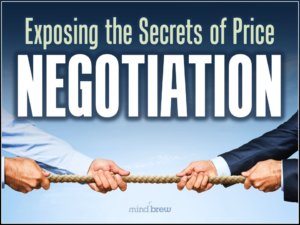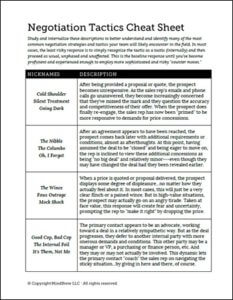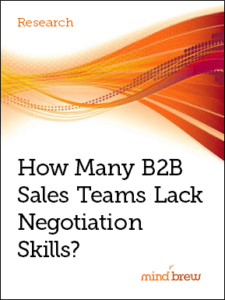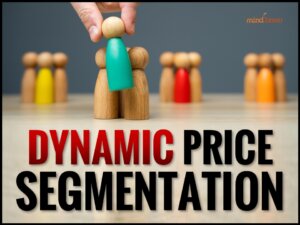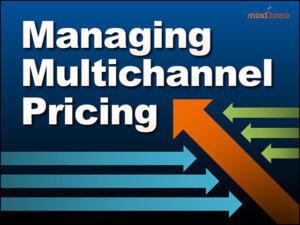Mastering the art and science of effective negotiation not only helps to secure advantageous deals, it also underpins the creation and reinforcement of long-lasting, profitable business relationships. That being said, far too many sellers end up sabotaging their own efforts by allowing certain myths and misconceptions to cloud their judgement and influence their behaviors and responses.
So let’s debunk a few of these self-destructive myths…
Myth 1: Buyers Have All the Leverage in a Negotiation
This is perhaps one of the most widely held beliefs, and it’s not entirely unfounded. After all, the buyer is the one with the immediate need and the money to spend. However, to say that buyers always have the upper hand is an oversimplification. In reality, the power dynamic in any negotiation is not static, but is subject to the unique circumstances of each situation or scenario.
Sellers often overlook or discount the leverage that their differential value proposition provides. If you’re offering a product or service that’s unique, exclusive, difficult to replicate, or challenging to substitute with an alternative, this can swing the balance of power in your direction. Recognizing, asserting, and effectively communicating your unique differential value is critical for sellers to gain and maintain negotiation advantage.
Myth 2: Small Talk and Gossip Aren’t Part of a Negotiation
Every interaction contributes to the negotiation process. And this includes all of the seemingly inconsequential chit-chat sellers often disregard as just being small talk, internal gossip or “venting.”
On one hand, these interactions might provide invaluable insights into the buyer’s personality, preferences, pain points, and motivations that can help a seller tailor their negotiation strategy.
On the other hand, these interactions may not be at all genuine in first place! After all, professional buyers will often deliberately script this innocuous small talk to “plant seeds” and convey messages that ultimately influence the seller’s perceptions, behaviors, and responses.
Myth 3: Negotiation Skills Only Matter on the Biggest Deals
Given the immediate and outsized impact that the biggest deals have on the top and bottom lines, it’s easy to conclude that this is where negotiation skills really matter. But small deals, while they might seem insignificant individually, can quickly accumulate, creating a substantial impact on your financial health.
Frequently providing concessions on these smaller transactions can not only result in an alarming overall financial drain, but can also set a precedent for future negotiations. A pattern of easy concessions can train buyers to push for similar discounts or benefits in future dealings, large or small, jeopardizing your negotiating position and gutting customer lifetime values.
Myth 4: The Buyer Will Get Mad and Walk Away Forever
The fear of a worst-case scenario, where the buyer severs ties due to unsuccessful negotiations, often coerces sellers into unnecessary concessions. While maintaining amicable business relationships is paramount, it’s essential to remember that negotiation is inherently a process of give-and-take.
Buyers are usually rational individuals, well aware that not every negotiation will unfold entirely in their favor. A firm but fair negotiation stance is less likely to alienate buyers and more likely to earn their respect. If you push back reasonably, the worst response you’re likely to get is a request for a “better” offer.
Myth 5: Salespeople and Execs are Natural Negotiators
While it’s true that certain traits common among salespeople and executives, such as excellent communication skills and charisma, can lend themselves well to negotiation, these alone do not equate to negotiation expertise and/or proficiency.
Negotiation is a multifaceted skill requiring a comprehensive understanding of various tactics, counter-tactics, and the ability to read and respond to subtle cues. These skills are not innate; they’re cultivated through training, experience, and a keen understanding of negotiation dynamics. Without this foundation, even the most charismatic and persuasive salesperson or executive may falter, missing opportunities to recognize and appropriately respond to negotiation tactics deployed by buyers.
The bottom line is that when it comes to developing and enhancing an organization’s negotiating capabilities, avoiding self-inflicted wounds borne of misguided myths and misconceptions is a giant leap in the right direction. There’s more to learn and more to do, of course. But recognizing the myths that might be holding you back is a great first step.

